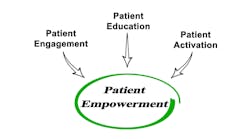Are Traditional Healthcare Providers Losing Ground to Disruptors?
Traditional healthcare providers are losing ground on new and expanding industry disruptors when it comes to providing a positive digital patient experience, according to two recent research reports.
One analysis, from software company Centric Digital and consulting firm Navigant, a Guidehouse company, revealed that such disruptors are outperforming nine out of 10 health systems when it comes to providing a seamless, integrated digital experience. This digital engagement expertise is putting health systems at risk of losing consumers to disruptors offering more routine, lower-acuity care, the analysis suggested.
A provider’s online experience often serves as a digital introduction for awareness and consideration of the care they offer, and how and where consumers can receive that care, according to the researchers. The analysis of the digital presence of more than 1,400 hospitals and health systems found that 90 percent of health systems’ consumer digital experience scores were lower than the lowest scoring disruptor. Some of the innovative players in this space that the report mentions include companies such as Oscar, Zocdoc, One Medical, and CVS Health.
The average score for health systems was 635 out of 1,000, compared to 771 for disruptors across five categories: online provider finders, innovative payers, health retailers, urgent care, and IT-enabled primary care. The analysis also found:
● Disruptors outperform health systems by over 140 points with search engine optimization for care needs.
● Only 45 percent of health systems allow consumers to search for available appointment times/request appointment information without logging into a portal, compared to 75 percent of disruptors.
● Only 3 percent of health systems have public chat.
“Disruptors are not only seizing the consumerization of healthcare in providing access, convenience, choice, and price transparency for lower-acuity services, they are also reaching customers with Amazon-like capabilities built into their tools,” Guidehouse Partner and Healthcare Technology Leader Subra Sripada, a former health system CIO, said in a statement. “This is one example of how disruptors—the same organizations aggressively competing with traditional providers for market share—are changing the healthcare landscape. Hospitals and health systems need to revisit their access strategies and bolster their tools to both protect their market and drive differentiation.”
The report did reveal that leading providers are investing in digital. Eighty percent of hospital and health system CFOs believe digital transformation is critical for their organization's long-term survival and to continue to provide high-quality patient services. One example is via Apple Health Records; some 330 health institutions now support the feature, which enables patients to view data such as immunizations, lab results, medications, and vitals directly in the Health app. Two years ago, just 39 healthcare providers were on board.
Patients aren’t wowed by providers’ digital tools
A separate report, meanwhile, from the Center for Connected Medicine, found that fewer than one in three health system professionals believe their organization is providing a best-in-class digital experience for patients. This data point suggests traditional healthcare providers could lose ground to more tech-savvy competitors, the report’s authors contended.
The CCM analysis, which included responses from 100 health system leaders, noted that patients increasingly expect their healthcare providers to offer apps and other digital health tools to assist with a multitude of tasks, including making appointments, checking their personal health data, messaging care teams and accessing virtual care. But while many hospitals and health systems have rolled out digital offerings, the report finds that these tools may not be keeping pace with patient expectations.
The CCM is jointly operated by GE Healthcare, Nokia and UPMC; UPMC Enterprises is the innovation, venture capital and commercialization arm of UPMC. “Patients now assume they’ll have the same digital experience in healthcare that they get everywhere else in their lives, and they’re dissatisfied when we don’t deliver,” said Katie Scott, vice president of digital strategy and innovation, UPMC Enterprises. “Increasingly, if hospitals and health systems can’t provide a feature-rich and seamless digital experience for their patients, those individuals are going to look elsewhere for care.”
Defined as apps, wearables, web tools, connected devices and telehealth platforms, patient-facing digital health tools are a critical or high priority at a majority of health systems, the research found.
“It is widely acknowledged that the key to closing the gap between consumers and their health systems and advance goals for improving outcomes is to transform healthcare toward digitally enabled tools focused on health and wellness,” said Anne Snowdon, R.N., Ph.D., director of clinical research, Healthcare Information Management and Systems Society Inc. (HIMSS) Analytics, which conducted the research in partnership with the CCM.
“Our survey finds that health systems are making progress on implementing digital tools, but they need to do more to close the gap between what patients expect and what is delivered,” Snowdon said.


